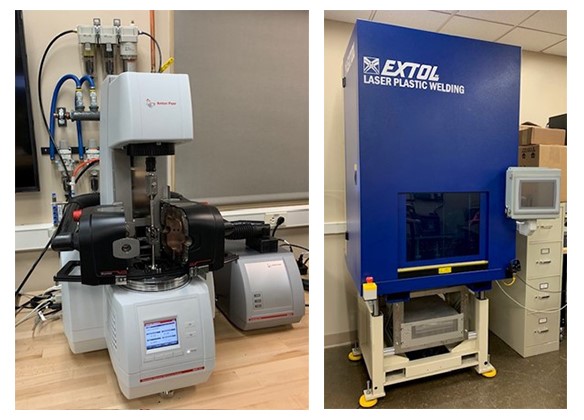
Over the past year, EWI has introduced new equipment to our polymers lab and broadened research and service offerings. Here’s an update on the resources now available to our clients.
Equipment and Capabilities
In late 2023, we acquired a fully outfitted Anton Parr 702e Rheometer with multiple functions. Adaptive elements for measuring solid or melted polymers across a large range of temperatures enable many tests (for example, rotating parallel plates for measuring viscosity as a function of temperature to determine how various dissimilar polymers can be durably joined). Other elements include dual cantilever and three-point bend fixtures for flexural properties, tensile fixtures for extensions stress/strain, compression for set, and torsional for measure stiffness. For all elements, the test can be either stress- or strain-controlled and measured in oscillatory or continuous modes. Using the instrument together with time-temperature superposition allows for long-term creep or stress relaxation predictions after short-term testing. As a bonus for EWI and its clients, we also procured elements to assess metal powders for measuring pack and flow properties. This added feature offers cross-department opportunities for use by our AM team and our cold spray center of excellence.
A two-micron Extol Laser Plastic Welder was installed in the lab early last month to extend our polymer joining capabilities. In addition to enabling unfilled polymer welding, the longer laser wavelength offers a new solution for medical manufacturers whose devices require transparent components. Clear-to-clear welding is also attractive to consumer product fabricators who want to enhance the appearance of products with see-through or “invisible” parts.

Research and Service Expansion
Plastic-to-metal welding has always been a challenge, and today there is high demand for it across manufacturing. EWI has continued to conduct significant research in this area, which in turn has led to polymer-to-metal project work in the automotive, medical product, and commercial building industries. EWI clients can work with us to leverage this advanced experience for their applications.
Our polymers team has also responded to the growing focus on hydrogen as a fuel source by conducting studies on the effect of H2 on polymers. With the launch of EWI’s hydrogen test lab last year, we are fully resourced to offer testing services backed by both polymer and corrosion engineering expertise. According to EWI Senior Technology Leader Jeff Ellis, “The impact of the hydrogen economy on plastics will be widespread. It will affect pipes, gaskets, seals, and compressors embedded in our national transmission and distribution infrastructure, but also necessitate changes in home components like meters, furnaces, and stoves to ensure consumer safety.”
If you would like to learn more about EWI’s recent R&D initiatives in polymers, click here. To talk to our polymer team today about a problem or a project, contact Jeff Ellis ([email protected]) or Miranda Marcus ([email protected]).
